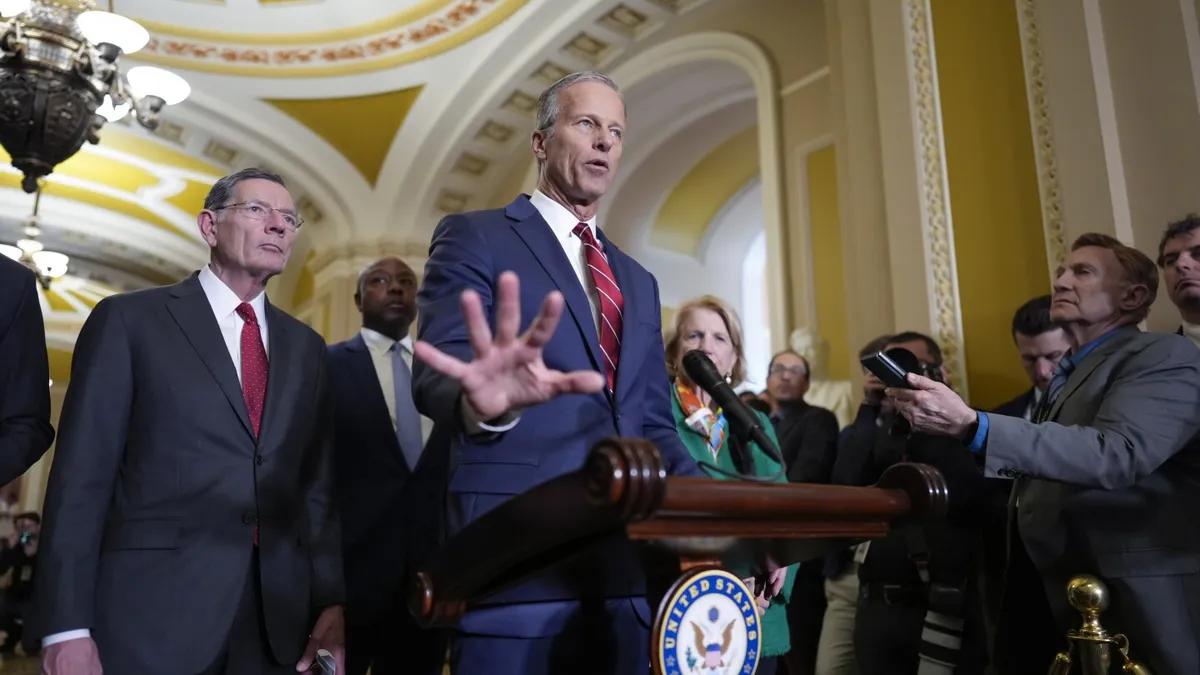
In a significant development for U.S. fiscal policy, the Senate is taking decisive action on President Donald Trump’s ambitious tax reform initiative, often referred to as the “big, beautiful bill.” This proposal includes $4.5 trillion in tax breaks and $2 trillion in spending cuts, and it emerges during a precarious time for both the U.S. and global economies. Following a surprising move by House Republicans to advance their framework over a month ago, Senate Republicans have now voted to begin working on their version of this extensive package.
On Thursday, the Senate voted largely along party lines, 52-48, to kick off discussions on Trump’s tax reform bill. This vote paves the way for what could potentially be a lengthy Senate session, extending into the weekend as lawmakers prepare for a possible all-nighter. The urgency of this legislation is compounded by the recent volatility in global markets, which have been unsettled by Trump’s extensive tariffs, complicating an already challenging political landscape for the Republican Party as they aim to solidify their signature domestic policy.
Senate Majority Leader John Thune (R-S.D.) expressed optimism as he opened the floor for debate, indicating that they are prepared to move forward with the tax reform bill. President Trump has signaled his support for the plan, and Republicans, holding a majority in Congress, are keen to demonstrate progress on fulfilling their campaign commitments. However, the voting commenced with one dissenting vote from Sen. Rand Paul of Kentucky, along with unanimous opposition from Democrats.
Despite being in the minority, Senate Democrats are leveraging procedural tools to extend the debate and raise concerns over the implications of the proposed tax cuts. They argue that the Republican focus on tax breaks for the wealthy risks undermining essential programs that millions of Americans rely on, including health care, child care, and school lunches. Senate Democratic Leader Chuck Schumer criticized the Republicans, claiming, “They’re mean, they’re nasty, they’re uncaring,” and vowed to expose their priorities during the debate.
Central to the Senate's tax reform package is the intention to make Trump’s initial tax cuts, which are set to expire at the end of the year, a permanent feature of the U.S. tax code. Senators are also considering additional tax cuts on tipped wages and Social Security income, among other areas. Furthermore, the package proposes to enhance funding for border security by approximately $175 billion, aimed at supporting Trump’s deportation initiatives, alongside increased national security funds for the Pentagon—key priorities for the Senate GOP.
One critical question remains: how will these proposed changes be financed? Historically, Republican deficit hawks have demanded spending offsets to mitigate lost tax revenue and avoid exacerbating the national debt, which currently stands at around $36 trillion. While House Republicans approved a package featuring $4.5 trillion in tax breaks alongside $2 trillion in spending cuts, Senate Republicans are adopting a different approach, arguing that existing Trump tax breaks do not need offsets since they are already established policy.
Senate Budget Committee Chairman Lindsey Graham contended that the proposed tax breaks should not require spending cuts, a stance that could lead to contentious debates concerning Senate rules. Conservative budget hawks within the party have raised alarms over the implications of such a strategy, particularly as the total price tag for the tax breaks exceeds $4 trillion. GOP leaders have assured their colleagues that the legislation could allow for a maximum of $2 trillion in spending reductions.
As the Senate prepares for a critical vote-a-rama on Friday night, where numerous amendments to the tax reform package will be proposed, a final vote could extend into Saturday. This legislation will eventually need to be reconciled with House proposals, with House Speaker Mike Johnson aiming for a completed package by Memorial Day, although the political climate presents uncertainties. The public’s reaction to proposed budget cuts is being closely monitored, especially as Trump’s administration, led by billionaire Elon Musk, enacts significant layoffs and program reductions across federal agencies.
As the Senate continues its work on this pivotal tax reform bill, the ramifications of Trump’s policies and the ongoing debate will undoubtedly shape the economic landscape for years to come.